
Businesses advised to enhance competitive capacity to reap CPTPP benefits
Latest
 |
| Vietnamese businesses have been advised to enhance their competitive capacity and take advantage of tariff preferences from the CPTPP. |
Hurdles lie ahead
Despite being severely impacted by the novel coronavirus (COVID-19) pandemic, Vietnamese exports to various CPTPP markets over the past year have made significant progress due to tariff preferences brought about by the trade pact. However, delegates attending a conference reviewing two years on from the implementation of the CPTPP said there remain challenges that must be swiftly addressed.
Addressing the conference held jointly between the Viet Nam Chamber of Commerce and Industry (VCCI) and the Australian Embassy in Ha Noi, Vu Tien Loc, President of the VCCI, noted that benefits from the opportunities of the pact remain limited, alongside plenty of technical matters and commitments which have so far proven to be unfavourable for domestic businesses.
Meanwhile, firms attributed these limitations to poor competitive capacity and unpredictable market fluctuations. In addition, they complained about their limited knowledge of Vietnamese commitments as part of the CPTPP, as well as the shortcomings of State agencies in terms of executing the deal and other free trade agreements (FTAs) that affect implementation of the trade pact.
A survey carried out by the VCCI indicates that 69% of businesses have heard about or have acquired a rudimentary knowledge of the CPTPP, a rather high figure when compared to other FTAs. However, only one of every 20 respondents is aware of CPTPP commitments relating to their own operation, whilst one of every four enjoys benefits from the trade pact.
A total of 75% of respondents have yet to benefit from the CPTPP as they have no business related to the markets or partners who have joined the deal, explained Nguyen Thi Thu Trang, director of the World Trade Organisation and Integration under the VCCI.
Trang added that relevant State management agencies have attempted to complete the legal framework in order to fully implement the CPTPP, although when it comes to implementation the majority of documents have been issued slowly, failing to meet the necessary requirements of commitments.
Strong Australian commitment
David Gottlieb, counselor for Economic and Development Cooperation at the Australian Embassy in Viet Nam, underscored the importance of utilising digital technology in the context of the COVID-19 pandemic. He recommended that Viet Nam seek to take advantage of the opportunities brought about by the CPTPP to increase digitalisation.
According to Gottlieb, the COVID-19 pandemic has presented a range of unprecedented challenges to the principles of free trade and market openness. Fortunately, CPTPP members such as Australia and Viet Nam have responded well to the pandemic and have still been able to fulfill their commitments to rules-based trade whilst maintaining open supply chains that boast positive and transparent information.
Both Australia and Viet Nam have competently controlled the spread of the pandemic due to the resilience of their economies, in addition to boosting exports, noted Gottlieb.
He took the view that the CPTPP maintains the ambitious scope and high-quality standards and rules laid out within the original Trans-Pacific Partnership. Given the current context, it remains imperative to fight protectionism whilst strengthening an open, efficient, fair, inclusive, and rules-based system built around trade that is capable of restoring global economic development.
Viet Nam should therefore be commended for its resolve to fully meet CPTPP commitments, said Gottlieb. Most notably, Australia is committed to working alongside the country towards a post-COVID-19 economic recovery, this includes efforts to establish and strengthen value chains while studying ways in which the CPTPP can be utilised to promote digital trade.

























